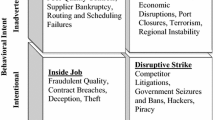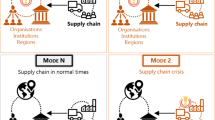Zusammenfassung
There exists a sizeable body of research on supply chain disruptions, with much of the emphasis (understandably) on major events, such as the effects and handling of explosions, earthquakes, or emission scandals. However, the whole day-to-day business in purchasing is overshadowed by the implications of a VUCA-world: unexpected events, like a missed deadline in a joint new product development project, are much more frequent and practically relevant than the headline-making disasters. Furthermore, unexpected events are not necessarily negative: it is also true that in reality buyers and suppliers often fulfill their obligations beyond what is contractually expected from them. Therefore, this paper addresses the practically relevant cases of how purchasing can handle everyday events which are either unexpectedly negative or surprisingly positive. How can damaged trust be repaired in the negative case, and how can the value generated by positive events be claimed by purchasing? Rigorously answering such practically relevant, yet academically underexplored questions —by means of a combination of scenario-based experiments with more than 1,000 purchasing and sales professionals and expert interviews—generates novel insights for purchasing managers and research alike.
Access this chapter
Tax calculation will be finalised at checkout
Purchases are for personal use only
Preview
Unable to display preview. Download preview PDF.
Similar content being viewed by others
Literatur
Arnold, U.; Eßig, M. (2003): Kooperationen in der industriellen Beschaffung. In: Zentes, J.; Swoboda, B.; Morschett, D. (Eds.): Kooperationen, Allianzen und Netzwerke, S. 659–681, Wiesbaden.
Bellamy, M.A.; Ghosh, S.; Hora, M. (2014): The influence of supply network structure on firm innovation. In: Journal of Operations Management, 32(6), pp. 357–373.
Bendoly, E. (2014): System dynamics understanding in projects. Information sharing, psychological safety, and performance effects. In: Production & Operations Management, 23(8), pp. 1352–1369.
Blau, P.M. (1964): Exchange and power in social life. New York.
Blau, P.M. (1968): Interaction. Social exchange. In: International Encyclopedia of the Social Sciences, 7, pp. 452–458.
Bode, C.; Wagner, S.M.; Petersen, K.J.; Ellram, L.M. (2011): Understanding responses to supply chain disruptions. Insights from information processing and resource dependence perspectives. In: Academy of Management Journal, 54(4), pp. 833–856.
Bottom, W.P.; Gibson, K.; Daniels, S.E.; Murnighan, J.K. (2002). When talk is not cheap. Substantive penance and expressions of intent in rebuilding cooperation. In: Organization Science, 13(5), pp. 497–513.
Bunderson, J.S. (2003): Recognizing and utilizing expertise in work groups. A status characteristics perspective. In: Administrative Science Quarterly, 48(4), pp. 557–591.
Craighead, C.W.; Blackhurst, J.; Rungtusanatham, M.J.; Handfield, R.B. (2007): The severity of supply chain disruptions. Design characteristics and mitigation capabilities. In: Decision Sciences, 38(1), pp. 131–156.
Cropanzano, R.; Mitchell, M.S. (2005): Social exchange theory. An interdisciplinary review. In: Journal of Management, 31(6), pp. 874–900.
Dirks, K.T.; Ferrin, D.L. (2001): The role of trust in organizational settings. In: Organization Science, 12(4), pp. 450–467.
Dirks, K.T.; Kim, P.H.; Ferrin, D.L.; Cooper, C.D. (2011): Understanding the effects of substantive responses on trust following a transgression. In: Organizational Behavior and Human Decision Processes, 114(2), pp. 87–103.
Dirks, K.T.; Lewicki, R.J.; Zaheer, A. (2009): Repairing relationships within and between organizations. Building a conceptual foundation. In: Academy of Management Review, 34(1), pp. 68–84.
Doerfler, S. (2017): Value and innovation with incumbent suppliers: Engaging in change management and looking beyond cost can help an organization achieve mutual profitability with its supply base. In: Inside Supply Management, 28(3), pp. 16–21.
Eberly, M.B.; Holley, E.C.; Johnson, M.D.; Mitchell, T.R. (2017): It’s not me, it’s not you, it’s us! An empirical examination of relational attributions. In: Journal of Applied Psychology, 102(5), pp. 711–731.
Eckerd, A.; Girth, A.M. (2017): Designing the buyer-supplier contract for risk management. Assessing complexity and mission criticality. In: Journal of Supply Chain Management, 53(3), pp. 60–75.
Eckerd, S. (2016): Experiments in purchasing and supply management research. in: Journal of Purchasing and Supply Management, 22(4), pp. 258–261.
Eckerd, S.; Boyer, K.K.; Qi, Y.; Eckerd, A.; Hill, J.A. (2016): Supply chain psychological contract breach. An experimental study across national cultures. In: Journal of Supply Chain Management, 52(3), pp. 68–82.
Ellis, S.C.; Henry, R.M.; Shockley, J. (2010): Buyer perceptions of supply disruption risk. A behavioral view and empirical assessment. In: Journal of Operations Management, 28, pp. 34–46.
Emerson, R.M. (1962): Power-dependence relations. In: American Sociological Review, 27(1), pp. 31–41.
Esslinger, J.; Eckerd, S.; Kaufmann, L.; Carter, C.R. (2019): Who cares? Supplier reactions to buyer claims after psychological contract over-fulfillments. In: Journal of Supply Chain Management, 55(4), pp. 98–128.
Fornell, C.; Larcker, D.F. (1981): Evaluating structural equation models with unobservable variables and measurement error. In: Journal of Marketing Research, 18(1), pp. 39–50.
Fugate, B.S.; Stank, T.P.; Mentzer, J.T. (2009): Linking improved knowledge management to operational and organizational performance. In: Journal of Operations Man-agement, 27(3), pp. 247–264.
Gharajedaghi, J. (2007): Systems thinking. A case for second-order-learning. In: The Learning Organization, 14(6), pp. 473–479.
Gligor, D.M.; Autry, C.W. (2012). The role of personal relationships in facilitating supply chain communications: A qualitative study. In: Journal of Supply Chain Management, 48(1), pp. 24–43.
Gordon, A.M.; Impett, E.A.; Kogan, A.; Oveis, C.; Keltner, D. (2012): To have and to hold. Gratitude promotes relationship maintenance in intimate bonds. In: Journal of Personality and Social Psychology, 103(2), pp. 257–274.
Hair, J.F.; Black, W.C.; Babin, B.J.; Anderson, R.E. (2010): Multivariate data analysis, 7th edition, Upper Saddle River, NJ.
Heide, J.B.; John, G. (1990): Alliances in industrial purchasing. The determinants of joint action in buyer-supplier relationships. In: Journal of Marketing Research (JMR), 27(1), pp. 24–36.
Hill, J. A.; Eckerd, S.; Wilson, D.; Greer, B. (2009): The effect of unethical behavior on trust in a buyer-supplier relationship. The mediating role of psychological contract violation. In: Journal of Operations Management, 27(4), pp. 281–293.
Homans, G.C. (1958): Social behavior as exchange. in: American Journal of Sociology, 63(6), pp. 597–606.
Kaufmann, L.; Esslinger, J.; Carter, C.R. (2018): Toward relationship resilience. Managing buyer-induced breaches of psychological contracts during joint buyer-supplier projects. in: Journal of Supply Chain Management, 54(4), pp. 62–85.
Kline, P. (2000): The handbook of psychological testing, 2nd edition, London, New York.
Lambe, C.J.; Wittmann, C.M.; Spekman, R.E. (2001): Social exchange theory and research on business-to-business relational exchange. In: Journal of Business-to-Business Marketing, 8(3), pp. 1–36.
Large, R.O. (2006): Interpersonelle Kommunikation und erfolgreiches Lieferantenmanagement. Analyse des externen Kommunikationsverhaltens von Beschaffungsmanagern auf Basis eines Strukturgleichungsmodells. In: Journal of Business Economics, 76(10), pp. 1005–1034.
Liu, P.J.; Lamberton, C.; Haws, K.L. (2015): Should firms use small financial benefits to express appreciation to consumers? Understanding and avoiding trivialization effects. In: Journal of Marketing, 79(3), pp. 74–90.
Liu, Y.; Luo, Y.; Liu, T. (2009): Governing buyer–supplier relationships through transactional and relational mechanisms. Evidence from China. In: Journal of Operations Management, 27(4), pp. 294–309.
Lo, S.; Aryee, S. (2003): Psychological contract breach in a Chinese context. An integrative approach. In: Journal of Management Studies, 40(4), pp. 1005–1020.
Moon, S.-A.; Kim, D.-J. (2005): Systems thinking ability for supply chain management. In: Supply Chain Management. An International Journal, 10(5), pp. 394–401.
Morrison, E.W.; Robinson, S.L. (1997): When employees feel betrayed. A model of how psychological contract violation develops. In: Academy of Management Review, 22(1), pp. 226–256.
Nakayachi, K.; Watabe, M. (2005): Restoring trustworthiness after adverse events: The signaling effects of voluntary “Hostage Posting” on trust. In: Organizational Behavior and Human Decision Processes, 97(1), pp. 1–17.
Narasimhan, R.; Narayanan, S. (2013): Perspectives on supply network-enabled innovations. In: Journal of Supply Chain Management, 49(4), pp. 27–42.
Newman, H. (1981): Communication within ongoing intimate relationships. In: Personality & Social Psychology Bulletin, 7(1), pp. 59–70.
Praxmarer-Carus, S.; Sucky, E.; Durst, S.M. (2013): The relationship between the perceived shares of costs and earnings in supplier development programs and supplier satisfaction. In: Industrial Marketing Management, 42(2), pp. 202–210.
Ring, P.S.; van de Ven, A. (1994): Developmental processes of cooperative interorganizational relationships. In: Academy of Management Review, 19(1), pp. 90–118.
Robinson, S.L. (1996): Trust and breach of the psychological contract. In: Administrative Science Quarterly, 41(4), pp. 574–599.
Robinson, S.L.; Rousseau, D.M. (1994): Violating the psychological contract. Not the exception but the norm. In: Journal of Organizational Behavior, 15(3), pp. 245–259.
Stölzle, W.; Gareis, K. (2002): Konzepte der Beschaffungslogistik – Anforderungen und Gestaltungsalternativen. In: Hahn, D.; Kaufmann, L. (Eds.): Handbuch Industrielles Beschaffungsmanagement, S. 401–423, Wiesbaden.
Tangpong, C.; Hung, K.-T.; Li, J. (2014): Agent-system co-development in supply chain research. Propositions and demonstrative findings. In: Behavioral Operations, 32(4), pp. 154–174.
Teller, C.; Kotzab, H. (2016): The importance of key supplier relationship management in supply chains. In: International Journal of Retail & Distribution Management, 44(2), pp. 109–123.
Timmer, S.; Kaufmann, L. (2019): Do managers’ dark personality traits help firms in coping with adverse supply chain events? In: Journal of Supply Chain Management, 55(4), pp. 67–97.
Weiner, B. (1974): Achievement motivation and attribution theory. Morristown, NJ.
Weiner, B. (1985): An attributional theory of achievement motivation and emotion. In: Psychological Review, 92(4), pp. 548–573.
Weiner, B. (1986): An attributional theory of motivation and emotion. Springer series in social psychology. New York.
Wowak, K.D.; Craighead, C.W.; Ketchen, D.J.; Hult, G.; Tomas M. (2016): Toward a “theoretical toolbox” for the supplier-enabled fuzzy front end of the new product development process. In: Journal of Supply Chain Management, 52(1), pp. 66–81.
Zaheer, A.; McEvily, B.; Perrone, V. (1998): Does trust matter? Exploring the effects of interorganizational and interpersonal trust on performance. In: Organization Science, 9(2), pp. 141–159.
Author information
Authors and Affiliations
Editor information
Editors and Affiliations
Rights and permissions
Copyright information
© 2020 Der/die Autor(en), exklusiv lizenziert durch Springer Fachmedien Wiesbaden GmbH , ein Teil von Springer Nature
About this chapter
Cite this chapter
Esslinger, J. (2020). Managing the unexpected: advancing knowledge on negative and positive events in buyer-supplier relationships. In: Bode, C., Bogaschewsky, R., Eßig, M., Lasch, R., Stölzle, W. (eds) Supply Management Research. Advanced Studies in Supply Management. Springer Gabler, Wiesbaden. https://doi.org/10.1007/978-3-658-31898-7_1
Download citation
DOI: https://doi.org/10.1007/978-3-658-31898-7_1
Published:
Publisher Name: Springer Gabler, Wiesbaden
Print ISBN: 978-3-658-31897-0
Online ISBN: 978-3-658-31898-7
eBook Packages: Business and Economics (German Language)




